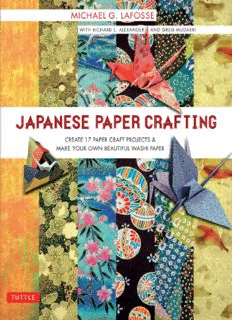
Japanese Paper Crafting : Create 17 Paper Craft Projects & Make your own Beautiful Washi Paper PDF
Preview Japanese Paper Crafting : Create 17 Paper Craft Projects & Make your own Beautiful Washi Paper
THIS BOOK IS DEDICATED WITH LOVE and special appreciation to my mother, Betty LaFosse, who encouraged me from my earliest memories to explore creative play with paper. Her sense of style and her taste for elegant design has inspired my art, and I continue to create things that we both enjoy. DISTRIBUTED BY North America, Latin America & Europe Tuttle Publishing 364 Innovation Drive North Clarendon, VT 05759-9436 U.S.A. Tel: 1 (802) 773-8930 Fax: 1 (802) 773-6993 [email protected] www.tuttlepublishing.com Japan Tuttle Publishing Yaekari Building, 3rd Floor 5-4-12 Osaki Shinagawa-ku Tokyo 141 0032 Tel: (81) 3 5437-0171 Fax: (81) 3 5437-0755 [email protected] Asia Pacific Berkeley Books Pte. Ltd. 61 Tai Seng Avenue, #02-12 Singapore 534167 Tel: (65) 6280-1330 Fax: (65) 6280-6290 [email protected] www.periplus.com Published by Tuttle Publishing, an imprint of Periplus Editions (HK) Ltd., with editorial offices at 364 Innovation Drive, North Clarendon, Vermont 05759 U.S.A. Copyright © 2007 Michael G. LaFosse All rights reserved. No part of this publication may be reproduced or utilized in any form or by any means, electronic or mechanical, including photocopying, recording, or by any information storage and retrieval system, without prior written permission from the publisher. Library of Congress Cataloging-in-Publication Data LaFosse, Michael G. Japanese paper crafting: create 17 paper craft projects & make your own beautiful washi paper / Michael G. LaFosse, with Richard L. Alexander, and Greg Mudarri. p. cm. Includes bibliographical references. ISBN: 978-1-4629-0812-7 (ebook) 1. Paper work. 2. Paper, Handmade. 3. Japanese paper. I. Alexander, Richard L., 1953-II. Mudarri, Greg, 1981-III. Title. TT870.L2337 2007 745.54--dc22 2007009553 First edition 12 11 10 09 08 07 10 9 8 7 6 5 4 3 2 1 Printed in Hong Kong Photo Credits (Page numbers correspond to the print edition.) Michael G. LaFosse: pp. 6, 12–14 (with Greg Mudarri); 30 (step 12), 31 (steps 17, 18), 72 Greg Mudarri: pp. 6, 12–14 (with Michael G. LaFosse); 51 (Seigaiha), 56, 58, 59, 62, 63, 65, 73–75, 83–87, 101 Richard L. Alexander: All other photographs Suminagashi patterns shown on p. 14 are by Marsha DuPre. ® TUTTLE PUBLISHING is a registered trademark of Tuttle Publishing, a division of Periplus Editions (HK) Ltd. ACKNOWLEDGMENTS T his book would not have been possible if not for the help and input from Richard L. Alexander and Greg Mudarri, my colleagues at Origamido Studio. They helped me with the text, the photos, and even the selection, design, and testing of the projects. First, I would like to thank Richard, my partner and co-founder of Origamido Studio, who took over many of the origami teaching duties as I worked out the diagrams and the how-to steps. He also took most of the photographs, juried the projects, and helped select the washi we used to make them. I am also indebted to Greg Mudarri, who had recently returned from a fifteen-month stay in Japan where he was teaching English and folding paper. Greg had been studying and working with us since 2003, so he was able to jump right in and lend his expertise for the presentation of the traditional projects that I wanted to show in this book, including the Noshi and Senbazuru projects. Finally, I would like to thank Holly Jennings and Sandra Korinchak, senior editors at Tuttle Publishing, for their patience and guidance through the process. Tuttle has been a great friend to people who love fine paper, paperfolding, and the simple elegance of traditional Japanese culture. I am grateful they gave me the opportunity to create such an interesting collection of beautiful, useful, and fun projects. CONTENTS Acknowledgments 3 Introduction 7 WASHI THE MAGNIFICENT “SKIN ” OF JAPAN The Special Qualities of Washi 9 A Brief History of Washi 10 Kinds of Washi 12 Uses for Washi 14 MAKING WASHI Preparing the Pulp 20 Tame-zuki: “Retaining Method” of Papermaking 26 Nagashizuki: Sheet Forming Technique 32 Adding Embedded Objects: Handmade Paper with Flower Inclusions 39 PREPARING WASHI FOR USE Folded Tie-Dyed Washi 42 Back-Coating 46 PROJECTS HONORED TRADITIONS Japanese Origami Crane 52 Origami Peace Cranes 56 Senbazuru: “Thousand Cranes” 57 Ehiroi 58 Imoseyama 60 Seigaiha 62 Noshi (Tsutsumi) 64 Hana Tsutsumi 65 Noshi Awabi 66 CELEBRATED FRIENDSHIPS Sailboat Envelope 72 Masu Box 76 Wallet or Clutch Purse 82 Crane’s Egg Modular Box 88 PERSONALIZED SPACES Tato 94 Vase Cover 97 Desktop Organizer (Pen/ Pencil/ Brush Holder) 101 “Ceramic” Form with Chigiri-e 104 Tulip Bowl 110 Hurricane Bowl 115 Sewn-Bound Washi Book 120 Bibliography & Resources 127 Symbols Key 128
Description: